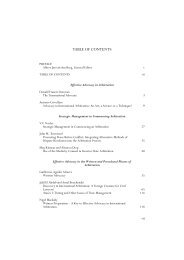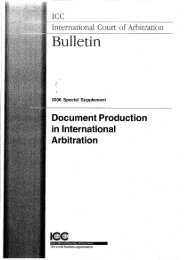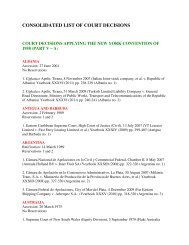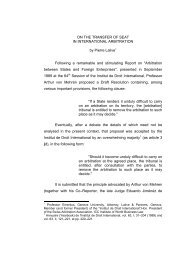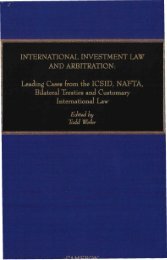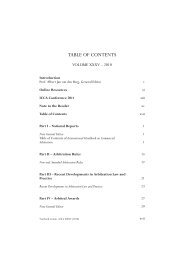Limits to Party Autonomy in International Commercial Arbitration
Limits to Party Autonomy in International Commercial Arbitration
Limits to Party Autonomy in International Commercial Arbitration
You also want an ePaper? Increase the reach of your titles
YUMPU automatically turns print PDFs into web optimized ePapers that Google loves.
(ii) <strong>to</strong> adopt procedures suitable <strong>to</strong> the circumstances of the arbitration, avoid<strong>in</strong>g<br />
unnecessary delay or expense, so as <strong>to</strong> provide a fair and efficient means for the<br />
f<strong>in</strong>al resolution of the parties' dispute.<br />
Such agreements shall be made by the parties <strong>in</strong> writ<strong>in</strong>g or recorded <strong>in</strong> writ<strong>in</strong>g by the<br />
Arbitral Tribunal at the request of and with the authority of the parties.<br />
14.2 Unless otherwise agreed by the parties under article 14.1, the Arbitral Tribunal shall have<br />
the widest discretion <strong>to</strong> discharge its duties allowed under such law(s) or rules of law as the<br />
Arbitral Tribunal may determ<strong>in</strong>e <strong>to</strong> be applicable; and at all times the parties shall do<br />
everyth<strong>in</strong>g necessary for the fair, efficient and expeditious conduct of the arbitration.<br />
14.3 In the case of a three-member Arbitral Tribunal the chairman may, with the prior consent of<br />
the other two arbitra<strong>to</strong>rs, make procedural rul<strong>in</strong>gs alone."<br />
It will be seen that article 14.1 adopts the pr<strong>in</strong>ciple of party au<strong>to</strong>nomy. However this is prescribed subject<br />
<strong>to</strong> certa<strong>in</strong> limitations <strong>in</strong>clud<strong>in</strong>g the arbitral tribunal's general duty "<strong>to</strong> adopt procedures suitable <strong>to</strong> the<br />
circumstances of the arbitration, avoid<strong>in</strong>g unnecessary delay or expense....". The rules closely follow<br />
section 33 of the <strong>Arbitration</strong> Act 1996 (UK). It is not immediately clear whether a tribunal could, for<br />
example, decl<strong>in</strong>e <strong>to</strong> accept the parties' agreement allow<strong>in</strong>g a long period of time for the provision of a<br />
memorial if it <strong>to</strong>ok the view that this would cause unnecessary delay or expense. Indeed one might<br />
wonder why a tribunal should be concerned about unnecessary delay or expense, a matter which will<br />
affect both of the parties, if the parties have agreed on the long period for the provision of the memorial.<br />
In any event the reference <strong>to</strong> fairness <strong>in</strong> article 14.1(ii) must be a reference <strong>to</strong> fairness <strong>to</strong> both parties and<br />
accept<strong>in</strong>g the parties agreement is fair <strong>to</strong> them both.<br />
A very broad discretion is conferred on the arbitral tribunal pursuant <strong>to</strong> article 14.2 <strong>in</strong> circumstances<br />
where the parties have not made an agreement with<strong>in</strong> article 14.1. It might be thought that an agreement<br />
under article 14.1 would usually be made at the beg<strong>in</strong>n<strong>in</strong>g of the arbitral proceed<strong>in</strong>gs. The first sub-<br />
article requires that the agreement be recorded <strong>in</strong> writ<strong>in</strong>g "by the Arbitral Tribunal".<br />
Under the UNCITRAL <strong>Arbitration</strong> Rules it would appear that the arbitral tribunal is not bound <strong>to</strong> accept<br />
an agreement of the parties as <strong>to</strong> a period of time. Article 15(1) provides as follows:<br />
"Subject <strong>to</strong> these Rules, the arbitral tribunal may conduct the arbitration <strong>in</strong> such manner as it considers<br />
appropriate, provided that the parties are treated with equality and that at any stage of the proceed<strong>in</strong>gs<br />
each party is given a full opportunity of present<strong>in</strong>g his case."<br />
In addition article 23 provides that the periods of time fixed by the arbitral tribunal for the communication<br />
of written statements should not exceed 45 days; however "the arbitral tribunal may extend the time limits<br />
if it concludes that an extension is justified". Further it should be noted that under the UNCITRAL<br />
<strong>Arbitration</strong> Rules, while it is the arbitral tribunal, rather than the parties, which is charged with the<br />
responsibility of determ<strong>in</strong><strong>in</strong>g the procedure <strong>in</strong> the arbitration, a number of rules expressly confer powers<br />
on the parties such as article 16(1) (Place of <strong>Arbitration</strong>), article 17.1 (Language of the <strong>Arbitration</strong>) and so<br />
on.<br />
Legal\103364080.1 10



